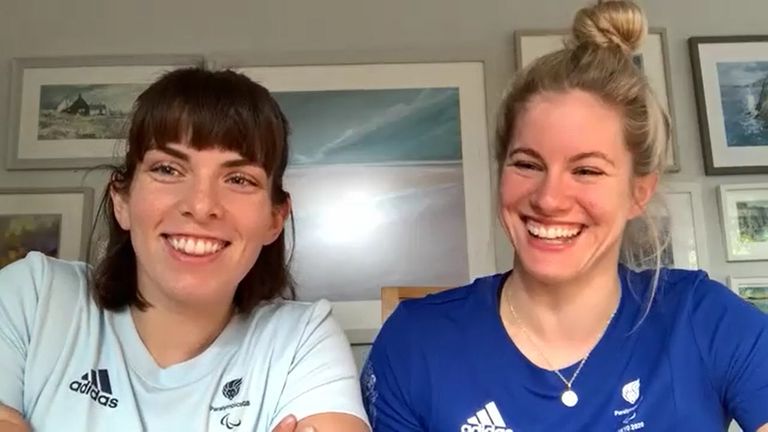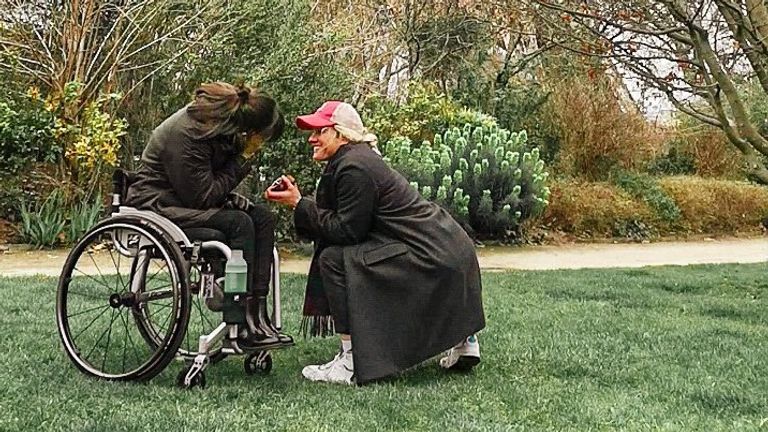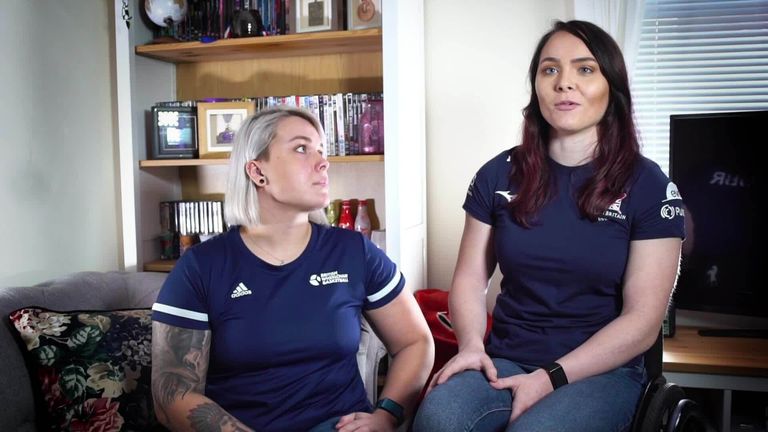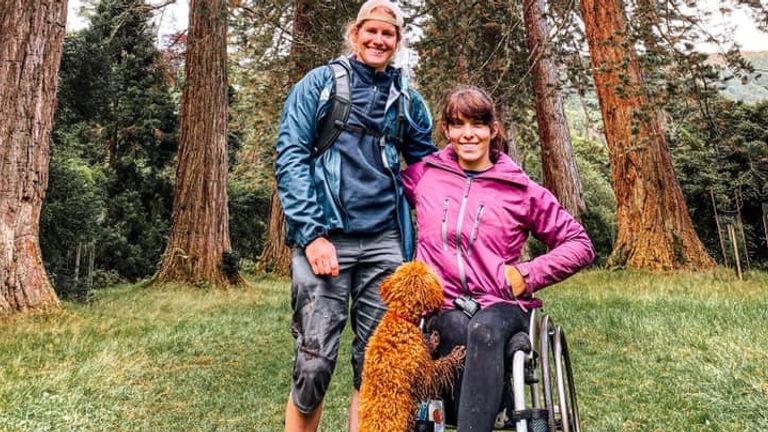Jon Holmes
Tokyo Paralympics: GB wheelchair basketball stars Laurie Williams and Robyn Love on 'flying the flag' for women's team sports
After a year that brought Paralympics postponement, an engagement in Paris and a loveable labradoodle called Whiskey, it's finally Tokyo time for GB couple Laurie Williams and Robyn Love - and they're determined to deliver medals alongside their wheelchair basketball team-mates
Last Updated: 24/08/21 11:28am
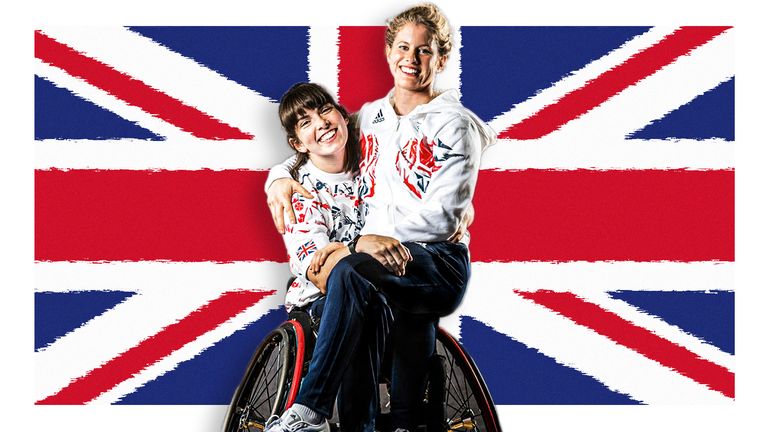
There's always a plethora of compelling personal stories at the Paralympics but in Laurie Williams and Robyn Love, the Great Britain squad has its very own power couple.
The wheelchair basketball stars are far too modest to take that tag for themselves, but they do cite Megan Rapinoe and Sue Bird as sporting role models - and like their heroes, they are empowering women and girls not just as athletes but also by bringing their whole selves to their sport.
The Americans both returned from Tokyo with medals - Rapinoe adding a bronze to the football gold she won at London 2012, Bird bringing home a fifth successive gold in basketball. Williams and Love want to emulate them in that respect too.
"If we didn't come back with a medal, we would be disappointed and we'd probably have underperformed," says Williams, who played alongside her fiancée at Rio 2016 when GB finished fourth. Since then, both women's and men's wheelchair basketball team programmes have benefitted from millions of pounds worth of UK Sport funding. Expectations are high.
"We've sacrificed a lot and slowly we've moved ourselves up the rankings - now we're ranked second in the world," explains Williams. "For a Great Britain women's programme, that's quite unbelievable. It's just never been in our history to get there - it's always been the Americans, the Germans, the Canadians and never really us.
"We've put in so many hours. I think it's our time."
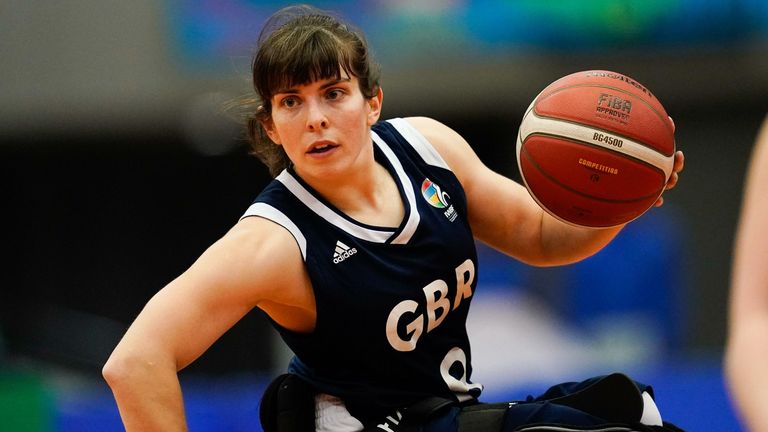
She is speaking to Sky Sports alongside Love from their home in Manchester, shortly before flying out to Japan. They will play their four group-stage games on consecutive days, beginning on Wednesday against Canada (6.45am BST) before taking on the hosts, Germany, and Australia. Then it's the knockout stages.
They are the only all-women side in team sports competing for Britain at these Paralympic Games - wheelchair rugby is mixed, and so are the team events in archery and boccia. Providing that team representation is something Love relishes. "Seeing how women's football and netball have grown over the past few years, I want wheelchair basketball to be that in parasport, where it captivates young women and girls.
"I want them to watch us and think, 'what an incredible team to be part of - I want to find a team so that I can compete and be just like them'. That's what I think our story is. It's so exciting and I hope that other women's sports teams in particular get behind us as the ones flying that flag in Tokyo."
Toil, technology, and breaking taboos
Even just on a video call, they ooze enthusiasm and belief which makes for a motivational interview. The team were runners-up at the 2018 World Championships and the 2019 European Championships - the Netherlands winning both finals - and got valuable experience of playing in Japan at the Osaka Cup tournament in February last year. The pandemic began shortly afterwards and radically altered their preparation, with a no-risk strategy put in place.
"We've put the work in behind closed doors," says Williams. "Any athlete would say warm-up games and friendly tournaments are vital heading into a big competition, but we've had none. We've just gone up against each other.
"It makes it hard to judge how we've developed but we've got a fantastic staff and coaches and we have to trust that." Love nods in agreement, acknowledging that protecting everyone's health had to be paramount. "We have been invited to play matches, but a conscious decision was made to keep us safe. We had to get to Tokyo first."
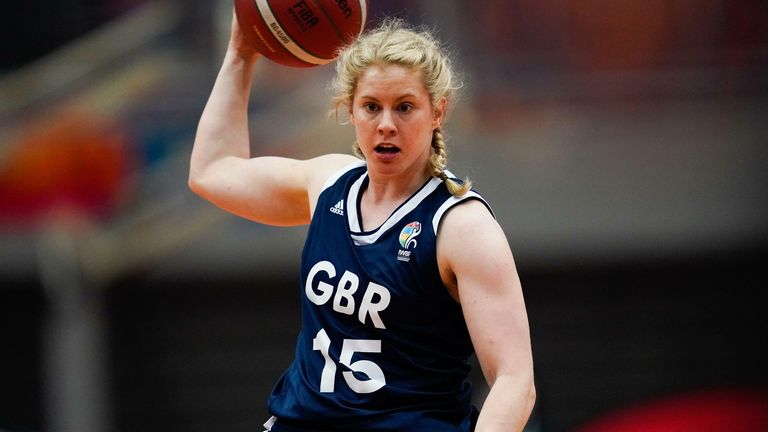
The disruption might have dented the GB players' confidence, knowing the pedigree of their opponents. Instead, Williams thinks it's probably levelled the playing field. "In the past, you could pretty much write who was going to win a medal but now it's so competitive," she says.
She mentions the Dutch due to their tournament successes most recently but adds: "When you come around to a Paralympic year, people start to pull all sorts out of the bag - players come out of retirement, or they've found some previously able-bodied player off the streets or something crazy like that.
"Perhaps in the past, we've been run into the ground a little bit - a lot of us have experienced fatigue in some form or another, just through overworking and too many competitions. But now we feel in a good place. It's a bit scary knowing our first competitive game in a year and a half is going to be out there, but that's the situation and we've all managed it incredibly well."
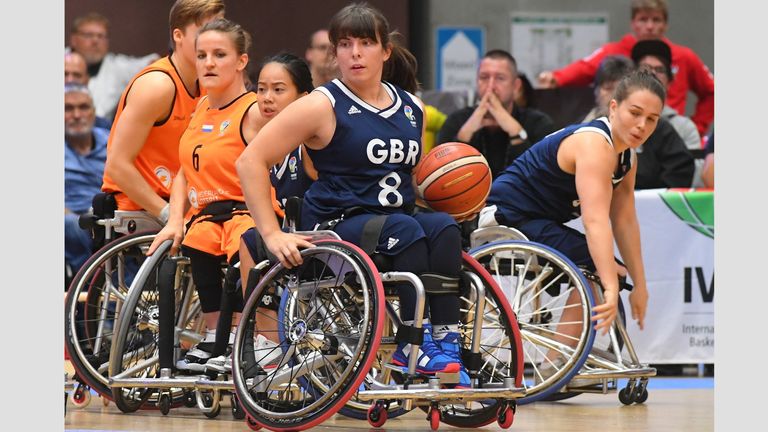
They are full of praise for ParalympicsGB's "fantastic" scenario-planning approach, and the attention to detail has included an investment in state-of-the-art technology - from Japan. Developed by former international wheelchair basketball player Yasuhiro Jimbo who started playing the sport after a motorcycle accident left him unable to walk, the Matsunaga chairs have helped take the British game to the next level.
Love is a self-described tech nut and has taken on an unofficial 'Rob the Builder' style role within the team. "That's me, I'm the one with the tool bag!" she laughs. "All the chairs are custom to us. Players come to me and say, 'Robyn, this is wrong with my chair, can you help me fix it?' I fiddle with mine all the time, sometimes to my detriment when I've moved something and can't remember what it is I've moved!"
She has arthrogryposis - a lower limb development impairment that means her right leg is shorter than her left, while both legs are missing muscles. "When I came into the sport, the basketball chair was a bit daunting to me because I'd never used a day chair before. But I quickly got used to it.
"You look at all of our chairs on court - why do some sit tall, and some small? That's part of the game because of the wide range of impairments that we have. It really challenges the manufacturers and I love learning about them and seeing what we can do to make them better."
Love compares her chair to a Formula 1 car, whereas Williams likens hers to a pair of running shoes. She has even appeared in a short film for Matsunaga; the link is in her Instagram bio. "They're so conscientious and hard-working," says Williams. "It's just a bonus for us that they're based out in Japan so when we're in Tokyo, they're literally at our beck and call all the time. I can't emphasise enough how important the chair is for us as athletes."
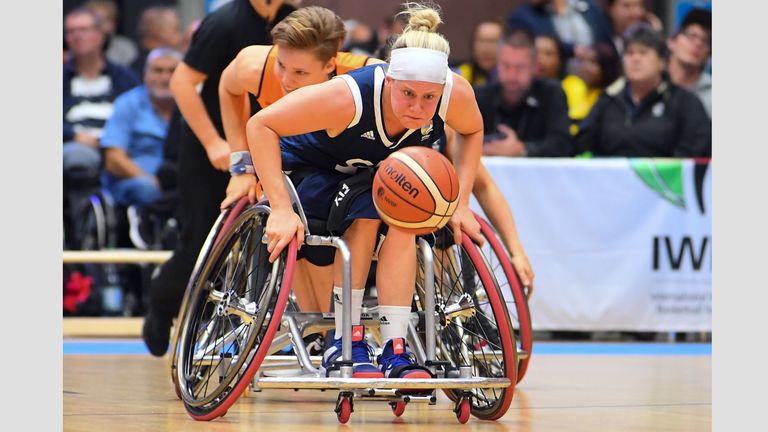
My basketball chair is like a Formula One car, it's my horse, it's my ice skates... over the years, the technology advances and the chairs are a cool piece of kit.
Robyn Love
Williams' disability is paralysis in the legs, the result of a virus she contracted at the age of 18 months. She moved from athletics into basketball in her early teens and was playing competitively by 16 years old, making her international debut the following year when she was also part of the GB team that won European bronze.
London 2012 was part of a steep learning curve - Williams and her team-mates lost in the quarter-finals to eventual champions Germany - but a shift had begun in Paralympic sport with Channel 4's ground-breaking coverage of the Games and its 'Meet the Superhumans' marketing campaign. The broadcaster's subversive slogans continue - this year's says 'To be a Paralympian, there's got to be something wrong with you'.
"I personally love it," says Williams. "I remember the first advert and thinking wow, that's absolutely bonkers. It got everyone talking.
"We've all got amazing stories. Sometimes people want to say, 'I'm not about my accident, or what's happened to me, or my disability'. But that's how people become interested in us because we've all had to overcome adversities, and often they've been difficult."
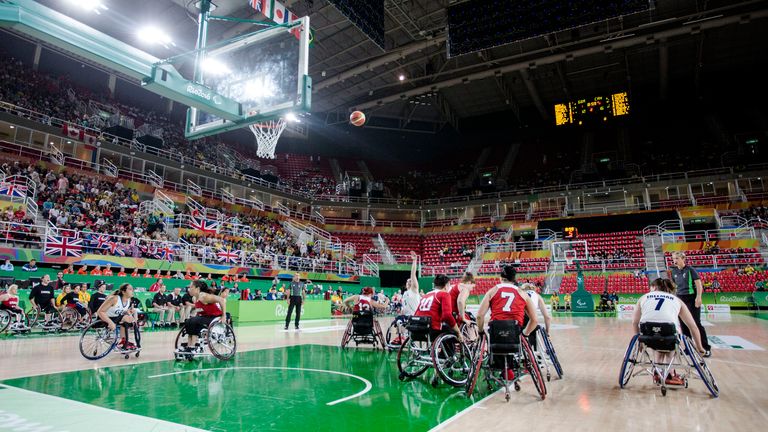
The path to a Paris proposal
Love was 22 and watching the Paralympics on TV when Williams was in action for GB at the O2 Arena. She'd never seen wheelchair basketball before and was hooked. Within two years, she had an invitation to take part in a GB training camp having impressed at the club she joined in Edinburgh. "For me, that's the legacy of London 2012 - it's incredible. And what I love about those slogans is they take regular phrases and stigma, and spin it around with dry British humour.
"They've got a billboard this year that says 'it's rude not to stare'. It's often like that - 'don't look, don't ask questions' - but the Games says no, ask us questions. And we're not things that should be hidden away until it comes to the Paralympics. It brings people with disabilities into the mainstream."
The visibility of their relationship has given others confidence, too. Within a few months of the training camp, Williams and Love started dating. Any slight nervousness at the potential reaction of their team-mates was soon dispelled as they were warmly received as a couple. In February, they announced their engagement while on a romantic break to Paris following the Osaka Cup.
It was Love who popped the question. "Laurie didn't know much about it! We went away for her birthday - or at least that's what she thought.
"I managed to pull it out of the bag and propose to her under the Eiffel Tower. It was one of the best surprises I've ever done in my life."
She explains how their confidence to share more about their lives off court through social media has grown over time, encouraged by role-model LGBTQ+ athletes like Helen and Kate Richardson-Walsh.
Their openness has been met with overwhelming positivity and brought additional opportunities - Love is an ambassador for Pride House Birmingham which will raise awareness around inclusion at next year's Commonwealth Games, where she will represent Scotland in 3x3 wheelchair basketball.
Two of their current GB team-mates, Jude Hamer and Lucy Robinson, are also out athletes - Hamer shared her story of finding love with para-rower Lauren Rowles as part of Sky Sports' Rainbow Laces campaign support last year. After an Olympics which smashed records for LGBTQ+ visibility, Williams is proud to be part of the continuing narrative in Tokyo.
"First of all, we're athletes - but to then be able to represent a community that can also go through hard times, that's really important," she says.
"As people with disabilities, we're in a minority anyway and I feel there's kind of a shared experience - it's not the same but there's an understanding there. As Paralympians, we come in all shapes and sizes, so to speak. It's very accepting.
"I'm still quite a private person. I don't like to document everything on social media, but we know that us being comfortably out as athletes could help to change someone's life."
Remarkably, 32 per cent of the 175 Olympians who were out while competing in Tokyo won medals, and Williams says their success was hugely inspiring.
When the Commonwealths roll around next summer, Love expects her Scottish team to be majority LGBTQ+, fuelling them with a double dose of pride. Williams will happily cheer her on as a spectator. "Robs and I always joke that if I did compete, then she wouldn't win so I've got to give her and Team Scotland a chance!"
That comment sends Love into fits of laughter. "Listen, I don't think we've ever competed against each other - I don't know how well that would go down, with the eye rolls and the evil stares!"
They have had to face off against each other at times during training for Tokyo - "we both hate losing so you've got to have a short memory," says Williams with a smile - but are otherwise inseparable. However, they did welcome Whiskey the labradoodle into their lives last year shortly after the Paralympics postponement was announced, bringing them both immense joy, and the new arrival quickly built up her own fan club.
"She's just the cutest little thing and I honestly can't imagine what this year would have been like if we hadn't had her," says Love. "We were talking about Paralympic slogans and she really is 'impossible to ignore' - when we go out on walks, everyone wants to talk to us because of the dog!
"At a time in the pandemic when it was quite lonely, that might have been the only time we talked to other people for quite a while. She's lovely and we're just so fortunate. The media especially seem to be very interested in her!" That's certainly been Williams' experience, not that she's complaining. "I've never been a dog person before, so I didn't know what all the hype was around them but now I'm completely obsessed with dogs.
"The beauty is she's got no idea that we're about to go to Tokyo. It's nice to know that whatever happens, she's just going to be there wagging her tail and full of love."
Even without Whiskey's photogenic pulling power, Paralympic sport couldn't hope for better promotion than that provided by Williams and Love. Their determination to deliver to their full potential as basketball players is all apparent, but it's their authenticity that shines through as well. They hope both these qualities have an impact on fans watching around the world, on whatever level they relate.
"Sport really can bring everyone together from all walks of life, especially with the Paralympics," says Love. "There's enough challenges to face without adding in any extra discrimination.
"For these Games, we'll have been together as a couple for six-and-a-half years. Getting to be there open, proud, and just being yourself is inspiring for people. It's an incredible platform to have."
Sky Sports is a member of TeamPride which supports Stonewall's Rainbow Laces campaign. Your story of being LGBT+ or an ally could help to make sport everyone's game. To discuss further, please contact us here.

